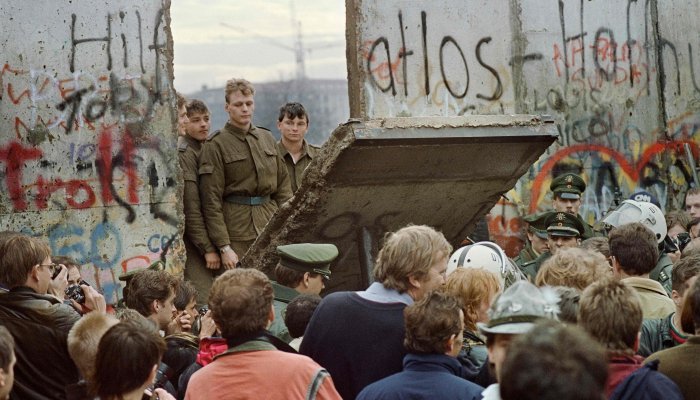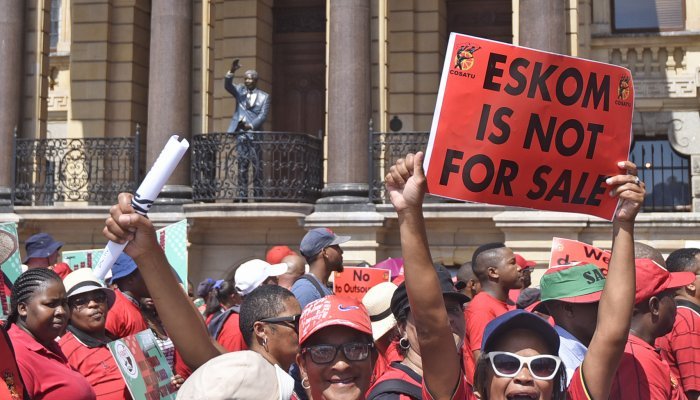Trade unions, and their allies on the far left of the political spectrum, are to South Africa’s job market what the Berlin Wall was to Germany. Whereas East German soldiers guarded the concrete barrier that partitioned the German city of Berlin into East and West Berlin, imprisoning millions of Germans in poverty-stricken communist East Germany, labour unions’ fear of free markets in South Africa has created a barrier akin to the Berlin Wall.
Trade unions stand guard on the barrier between employment opportunities and poverty. This is South Africa’s own proverbial Employment Wall. On the other side of this Employment Wall are more than six million unemployed South Africans trying to jump over to the side of job and economic opportunities. But anyone who tries to scale or tear it down gets mercilessly shot down by the trade unions.
Finance Minister Tito Mboweni found this out the hard way after publishing National Treasury’s Economic transformation, inclusive growth, and competitiveness: Towards an Economic Strategy for South Africa document in August. This was Mboweni’s latest, boldest bid to liberalise the economy and revive growth. And it was immediately and mercilessly trashed by the guards watching over the Employment Wall. Others who have tried to liberalise the economy have met a similar fate, including former president Thabo Mbeki.
Die mauer
East German guards manned the Berlin Wall for the 28 years it existed from 1961, literally shooting and killing anyone who attempted to escape the Soviet-backed enclave for the freedom and prosperity of the West where the free market reigned supreme.
Metaphorically speaking, the Congress of South African Trade Unions (Cosatu), the South African Federation of Trade Unions (Saftu), and others, backed by the ‘vanguard of the working class’, the South African Communist Party, have also been shooting down any idea that seeks to tear down the Employment Wall by attempting to lower the cost of doing business and creating an environment conducive to much-needed foreign direct investment.
After transitioning to democracy 25 years ago, and in an attempt to prevent a repeat of the abuse of workers during Apartheid, South Africa entrenched the rights of employees and their trade union representatives in its basic law of labour relations. The Basic Conditions of Employment Act of 1997 and the Labour Relations Act of 1995 were the first major pieces of legislation to safeguard worker rights and fair labour practices, and granted workers previously unattainable organisational and other rights, placing stringent requirements on employers on labour matters.
These pieces of legislation became the building blocks of this Employment Wall, which is built on the solid foundation that is the Bill of Rights in section 23 of the Constitution, which declares that “every worker has the right to strike”.
However, as all good things tend to carry some unintended consequences, these well-meant but rigid pieces of legislation have been blamed by many an economist and investor as the major impediment to job growth. Many cite the stringent requirements employers must go through in order to cut a job that has either become untenable for the employer, or redundant.
Very few countries allow workers the right to strike against an employer with whom they have neither a dispute nor employment relation, which is generally called a sympathy strike. Job-starved South Africa is one of these countries.
Comrades
Standing guard on this Employment Wall, trade unions have been able to use their alliance with the governing ANC to block any attempt to liberalise the marketplace by loosening some of these most stringent of requirements imposed on employers.
Trade unions have also been vocal defenders of the status quo, insisting the economy can and must grow while carrying the state-owned companies that have demonstrated their inability to survive without ruinous government financial support. Among these are SAA, PetroSA, Eskom, and arms manufacturer Denel. The government throws billions of rands into these companies, all of which have been bankrupt for years, in an attempt to protect the tens of thousands of jobs they sustain, even though many provide no discernible service critical to the country.
Instead, it is universally accepted that Eskom, in particular, with its outstanding debt of more than R450 billion, is the single biggest threat to the economy. Continually bailing out the others, which have all been gutted by corruption, political interference and mismanagement, provides moral hazard.
Confronted by an unemployment rate closing in on 40% in the expanded definition, in 2019, Treasury’s paper, in a nutshell, pointed out the obvious. It said the low growth of less than 1%, together with rising unemployment, meant that South Africa’s “economic trajectory is unsustainable”, and that “Government should implement a series of growth reforms that promote economic transformation, support labour-intensive growth, and create a globally competitive economy”.
As finance minister, and with the responsibility of economic policy, it is Mboweni’s job to take leadership and initiate measures to boost growth.
Shock treatment
The most striking of Mboweni’s proposals to kickstart growth are for electricity producer Eskom to sell some or all of its power stations in order to raise about R450 billion to settle its choking debt. These power stations would then sell electricity back to Eskom at pre-determined prices as governed by the National Electricity Regulator of South Africa (Nersa).
In essence, Mboweni was suggesting that Eskom, and by extension, the government, should be relieved of the burden of investing billions in hugely capital-intensive power stations. Maintenance costs for the older coal-fired power stations that generate more than 95% of Eskom’s power can also be hugely expensive, which soaks in capital that could be used more profitably elsewhere.
Eskom must service its outstanding debt of R450 billion from the R33 billion cash it generated from selling electricity in the year ending March 2019. Interest on this amounted to R28 billion while redemptions of maturing debt required another R31 billion. Employee costs in 2019 topped R33 billion. In addition to this, maintenance of power station infrastructure and other assets requires more than R20 billion every year.
...it is Mboweni’s job to take leadership and initiate measures to boost growth.
This sorry state of affairs has forced Eskom to borrow more money from the capital markets in order to settle debt falling due.
Fighting change
Both Cosatu and Saftu, as well as the National Union of Mineworkers, were, however, not pleased with Mboweni’s enthusiasm to perform the job for which he’s been hired. Instead of tearing down the Unemployment Wall, they demanded he tear up the document.
And of course, the union federations provided no new solutions to the old problem of unemployment. Instead, their remedy is to keep doing more of the same, which is for the government to pump more money into the SOE albatrosses, among them Denel, which received yet another R1.8 billion cash bailout in August. That is by no means the last bailout for the arms maker. The SABC, PetroSA, and others, are still in the queue for more.
The Berlin Wall eventually collapsed under the weight of human desire for freedom and prosperity 28 years after it was built. For all the time that the wall stood, the guards in communist East Germany were also stationed on its poverty-stricken side. Perhaps that is why the Berlin Wall eventually fell?
Unlike the East Germans, the guards at our proverbial Employment Wall are still well-armed with their powerful political rifles almost 26 years later. Sitting on the correct side of the barrier, they are also still well-fed, thus they continue to shoot down anyone who tries to escape the poverty of unemployment on the other side.






